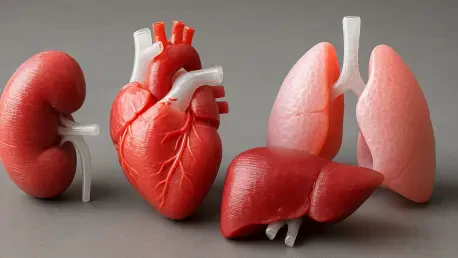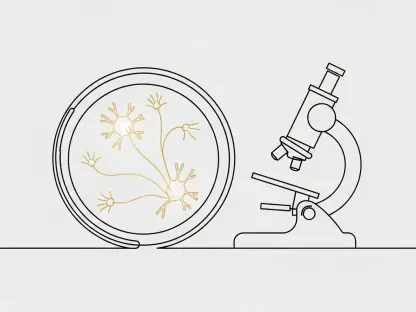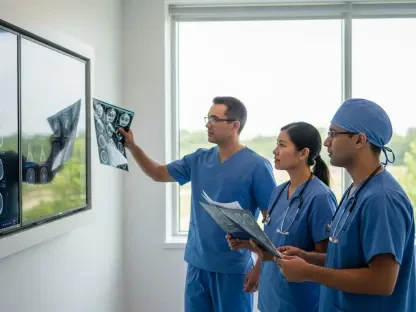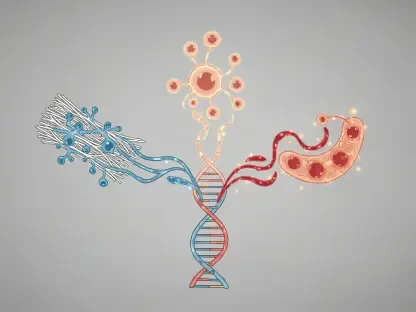Imagine a world where the agonizing wait for a life-saving organ transplant becomes a relic of the past, replaced by the ability to print a custom organ tailored to a patient’s unique biology, and Israel is stepping into this visionary future with the launch of a groundbreaking research institute dedicated to 3D-printed organs, artificial intelligence-driven medical solutions, and cutting-edge robotics. Announced by President Isaac Herzog in a ceremony in Jerusalem, this ambitious initiative seeks to confront some of the most pressing challenges in healthcare, such as the critical shortage of donor organs and the growing need for personalized medical treatments. By harnessing innovative technologies and fostering global collaboration, Israel is not just aiming to transform medicine within its borders but to set a new standard for healthcare worldwide. This bold move builds on the nation’s established reputation in bioengineering, positioning it as a potential leader in a field that could save millions of lives.
Pioneering Organ Fabrication Technology
Israel’s new research institute places a significant emphasis on the transformative power of 3D printing to address the global organ shortage crisis. A historic milestone came in 2019 when researchers at Tel Aviv University successfully created the world’s first 3D-printed heart using a patient’s own cells, complete with blood vessels and chambers. Though this achievement was on a small scale and not yet ready for human transplantation, it showcased the immense potential of bioprinting. The institute is now tasked with overcoming the substantial barrier of scaling these creations to fully functional, human-sized organs. Efforts are underway to develop biocompatible materials and printing techniques that ensure tissues can integrate seamlessly with the body, offering hope to countless patients on transplant waiting lists. If successful, this technology could fundamentally alter the landscape of regenerative medicine by providing a sustainable solution to a long-standing healthcare dilemma.
Beyond the technical feats, the focus on 3D-printed organs also highlights a shift toward patient-centered innovation. The ability to use a patient’s own cells reduces the risk of rejection, a common issue with traditional transplants, and opens the door to truly personalized medicine. The institute is prioritizing research into creating complex structures like kidneys and livers, which are in high demand globally. Collaboration between engineers, biologists, and medical professionals is central to this endeavor, ensuring that the resulting organs meet clinical standards for safety and efficacy. Additionally, the initiative is exploring ways to accelerate production timelines, aiming to make these solutions accessible within a realistic timeframe. While challenges remain in mimicking the intricate functionalities of natural organs, the progress so far suggests that Israel could be on the cusp of a medical breakthrough with far-reaching implications for humanity.
Harnessing Artificial Intelligence for Medical Breakthroughs
Artificial intelligence stands as a cornerstone of Israel’s strategy to revolutionize healthcare, offering tools to enhance precision and personalization in treatment. By processing vast amounts of medical data, AI algorithms can predict the viability of 3D-printed organs, identify potential complications before they arise, and tailor solutions to individual patients. This technology is proving invaluable in surgical planning, where detailed, patient-specific 3D models replace less reliable methods like animal testing. Such advancements allow doctors to rehearse complex procedures in a virtual environment, significantly reducing risks during actual surgeries. The integration of AI with bioprinting—often termed bio-convergence—promises to elevate the accuracy of medical interventions to unprecedented levels, potentially transforming how healthcare providers approach everything from transplants to routine care.
Moreover, AI’s role extends into real-time decision-making, providing surgeons with actionable insights during critical procedures. For instance, machine learning systems can analyze live data to adjust 3D printing parameters on the fly, ensuring optimal outcomes for organ integration. This capability is particularly crucial when dealing with the unique anatomical variations among patients, which traditional methods often struggle to accommodate. The institute is also investing in AI-driven simulations to anticipate long-term effects of printed organs, such as how they adapt to the body over time. By replacing guesswork with data-backed precision, these innovations aim to improve patient recovery rates and reduce healthcare costs. As Israel pushes forward with these developments, the global medical community is watching closely, recognizing that the successful application of AI in this context could set a new benchmark for personalized medicine worldwide.
Advancing Surgery Through Medical Robotics
Medical robotics represents another vital pillar of Israel’s ambitious healthcare vision, bringing unparalleled precision to surgical practices and organ implantation. Innovations such as soft robotic arms designed for in-body 3D printing are redefining how surgeries are performed, enabling minimally invasive techniques that reduce patient trauma and recovery times. Autonomous robotic systems are also being developed to assist in delicate procedures, ensuring that 3D-printed implants are positioned with exacting accuracy. Israeli companies are already at the forefront of rapid tissue printing, and the new institute plans to amplify these efforts by embedding real-time AI analytics into robotic platforms. This synergy aims to minimize post-operative complications, offering a glimpse into a future where surgeries are safer and more effective than ever before.
The impact of robotics goes beyond mere precision, as it also addresses the human limitations often encountered in complex medical procedures. Surgeons, no matter how skilled, face challenges with fatigue and manual dexterity during lengthy operations, but robotic systems can operate with consistent accuracy for extended periods. The institute is exploring ways to integrate these technologies into existing hospital workflows, ensuring they complement rather than replace human expertise. Training programs for medical staff are being developed to facilitate this transition, focusing on how to leverage robotics for optimal patient outcomes. Additionally, the potential to perform remote surgeries using robotic systems could expand access to specialized care in underserved regions. As these advancements unfold, Israel’s commitment to merging robotics with bioprinting and AI signals a transformative shift in surgical standards, with the potential to benefit patients across the globe.
Positioning Israel as a Global Healthcare Leader
Israel’s strategic vision extends far beyond national boundaries, aiming to establish the country as a dominant force in the global medical technology arena. Significant financial backing, such as the NIS 40 million allocated by the Israel Innovation Authority to bio-convergence startups in 2023, underscores a commitment to fostering innovation. This funding has attracted international investors and partnerships, amplifying the reach of Israeli advancements. President Herzog has emphasized the importance of sharing AI datasets with global collaborators to accelerate the adoption of these cutting-edge technologies. Such initiatives could position Israel ahead of competitors in Europe and the United States, creating a hub for medical research that draws talent and resources from around the world, ultimately benefiting patients everywhere.
Economic and diplomatic implications also play a role in Israel’s aspirations to lead in healthcare innovation. By cultivating an ecosystem that supports startups and interdisciplinary research, the country is not only driving technological progress but also creating jobs and strengthening ties with other nations. The institute serves as a platform for international collaboration, inviting experts from diverse fields to contribute to solving universal healthcare challenges. This approach aligns with a broader trend of bio-convergence gaining traction globally, where the fusion of biology and technology is seen as the future of medicine. Projections suggest that within the next five years, functional 3D-printed organs could enter clinical trials, a timeline that could see Israel setting the pace for others to follow. As these efforts gain momentum, the nation’s role as a pioneer in medical tech becomes increasingly evident, promising to reshape global health standards.
Addressing Barriers and Ethical Dilemmas
Despite the optimism surrounding Israel’s medical advancements, significant challenges loom on the horizon that must be navigated with care. Technical hurdles, such as developing scalable bioprinting materials capable of replicating the complexity of human organs, remain a formidable obstacle. Regulatory frameworks are another concern, as approving 3D-printed organs for clinical use involves rigorous testing and compliance with international standards. Intellectual property disputes over AI-assisted designs further complicate the landscape, potentially slowing the pace of innovation if not addressed through clear policies. The institute is actively working to tackle these issues by fostering dialogue among scientists, regulators, and industry leaders to create solutions that balance progress with safety and accountability.
Ethical considerations add another layer of complexity to this pioneering work, as questions of access and equity come to the forefront. Ensuring that life-saving technologies like 3D-printed organs are available to all, regardless of socioeconomic status, is a pressing concern that requires thoughtful planning. Discussions in global forums highlight the need for frameworks that prevent these advancements from becoming exclusive to wealthier populations or nations. The institute is committed to addressing these societal implications, exploring partnerships with organizations focused on healthcare equity. Additionally, public trust in such novel technologies must be cultivated through transparency about risks and benefits. As Israel pushes the boundaries of what’s possible in medicine, striking a balance between innovation and ethical responsibility will be crucial to realizing the full potential of these groundbreaking efforts.
Shaping the Future of Medicine
Reflecting on Israel’s bold strides, it’s clear that the establishment of a dedicated institute for 3D-printed organs and AI-driven medicine marks a pivotal moment in healthcare history. The fusion of bioprinting, artificial intelligence, and robotics showcases a pathway to solving critical issues like organ shortages and imprecise surgeries. Efforts to overcome scalability challenges, navigate regulatory landscapes, and address ethical concerns demonstrate a comprehensive approach to innovation. Looking ahead, the focus should shift toward actionable steps, such as expanding international collaborations to share knowledge and resources, ensuring that breakthroughs benefit diverse populations. Investing in education for healthcare professionals to adopt these technologies seamlessly will also be vital. By continuing to prioritize equity and transparency, Israel paves a foundation for a future where medical advancements can transform lives on a global scale, offering hope where once there was none.









